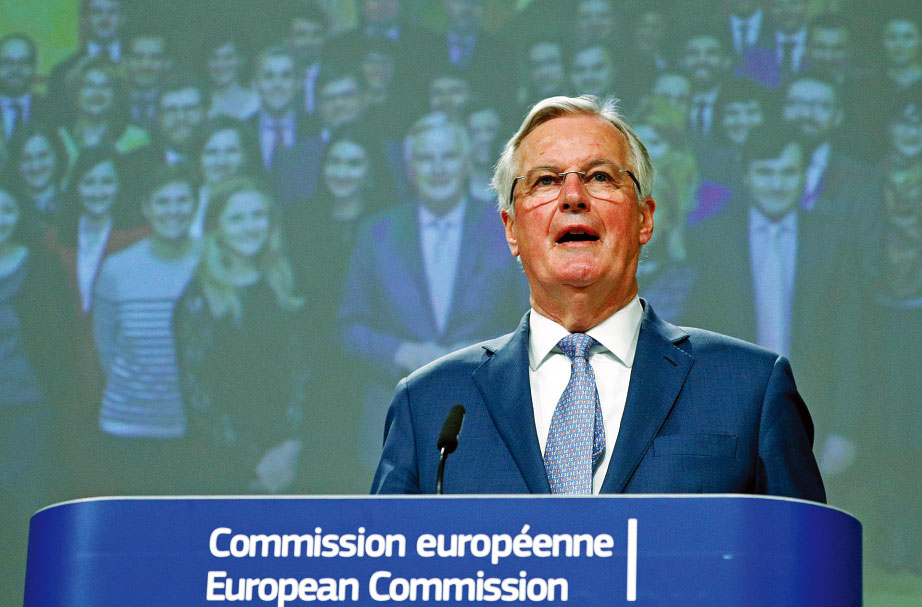
EU's Brexit negotiator Michel Barnier holds a news conference setting out the European Commission's plans for negotiations with Britain, in Brussels, Belgium on Monday. [FRANCOIS LENOIR/REUTERS]
European Union Chief Negotiator Michel Barnier said on Monday that the EU is willing to offer the United Kingdom a "highly ambitious trade deal" in the aftermath of Brexit if the UK agrees to fair and open competition and an agreement on fisheries.
Barnier laid out the EU's draft negotiation guidelines with the UK just three days after the UK formally left the EU on Friday. The two sides have now entered an 11-month transition period before they hope to reach a deal, notably a free-trade agreement, by Dec 31.
Draft guidelines to be submitted to the European Parliament on Wednesday and to be approved by the European Council cover the economic and security partnerships and institutional framework and governance of future partnership between the EU and the UK.
"We are ready to offer a highly ambitious trade deal as the central pillar of this partnership," Barnier told journalists.
Under the EU plan, the trade deal will include zero tariffs and zero quotas on all goods entering the EU's single market of 450 million people. It will also include an ambitious free trade agreement in services with sectoral coverage, from business services to telecommunications or environmental services.
"We are also looking to include digital trade, intellectual property and access to our respective public procurement markets," Barnier said.
In a news release on Monday, European Commission President Ursula von der Leyen said: "It's now time to get down to work. Time is short. We will negotiate in a fair and transparent manner, but we will defend EU interests, and the interests of our citizens, right until the end."
The former German defense minister had breakfast on Monday with the UK's EU Commission staff to listen to their views on the new partnership.
The EU has expressed the opinion that the 11 month timeframe is too short for negotiation and would like to extend it, but UK Prime Minister Boris Johnson has insisted that it must end by Dec 31.
Barnier, a former French foreign minister, said that the draft mandate makes clear that the exceptional offer is conditional on at least two things due to the geographical proximity and economic interdependence.
"We need to make sure competition is, and remains, open and fair," he said, adding that the EU and the UK have agreed that their future partnership will prevent "unfair competitive advantages".
The EU stated that the two sides must now agree on specific and effective guarantees to ensure a level playing field over the long term, which Barnier describes as a "mechanism to uphold the high standards we have on social, environmental, climate, tax and state aid matters, today and in their future developments."
Barnier stressed that the free trade agreement must include an agreement on fisheries that provides for continued reciprocal access to markets, and to waters, with stable quota shares.
"If we can agree on this, as well as on robust commitments towards a level playing field and the necessary enforcement mechanisms, we will achieve a very ambitious free and fair trade agreement," he said.
He noted that even the two sides agree on such a "best-in-class "free trade agreement, it will not be "business as usual." Von der Leyen and other EU leaders have also expressed that no sort of deal will be better than the treatment received when staying in the EU, a clear message that no member state should follow the UK.
Under the future partnership, the EU and the UK will be two separate markets instead of one single market. For example, rules of origin and customs formalities will apply between the EU and the UK, and the UK's access to the EU market will be subject to certification and market authorization and supervision activities.
The EU had decided to give Spain the power to exclude Gibraltar from any trade deal, a move seen as the EU's leverage in negotiating with the UK to counter its preparation to impose full customs and border checks on all European goods entering the country.
"Compromises hammered out in the next 11 months by both British and European negotiators, will dictate the UK's economic landscape for decades to come," said Maria Demertzis, an economist and deputy director at Bruegel, a Brussels-based think tank.


